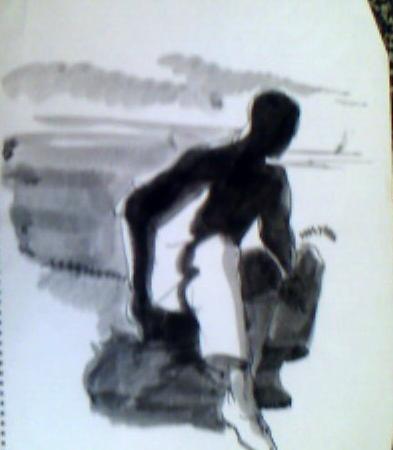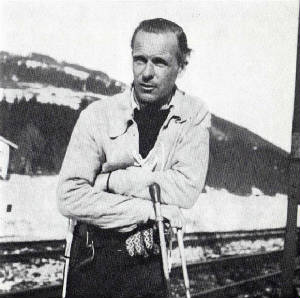
| Home | Lineage and Birth | The early years. | Conrad the Mountee. | 23rd of August 1914 | Captivity Espionage and Escapes | Augustabad | Barry Bingham VC | Conrad meets M | Conrad Assistant Military Atache. | The ffrench Connection | The Last Tigerhunt. | The Archaeology of the Reich | From Intrigue and artifice to Art. | The names Ffrench, Conrad Ffrench. | Ian Fleming | The Black Ore of Death | An Evil Medium | Off the Chessboard. | Arbutus Point. | Conrad retires to the field | The Art of Conrad O'Brien-ffrench | The Quotient of Conjecture. | News and Gossip | Bookshop & Bibliography | Mailbag | Related Links | Contact Me | ||||||||||||
|
Conrad Fulke O'Brien-ffrench. Artist and Spy. |
||||||||||||
|
Ian Fleming
|
||||||||||||
|
|
||||||||||||
|
It was a
sunny afternoon when Conrad arrived with Maud at the Tiefenbrunner café in
Kitzbühel. Peter Fleming and his wife, Celia, were at a table with Arthur Waley
and Ella Maillart. Sitting apart, a
little aloof, was a handsome young man reading a spy novel by Buchan, Ian Fleming.
Accompanying Conrad and Maud was a dazzlingly beautiful young woman, Margarita
Brambeck, a house guest. Ian looked up, closed his book and joined the group’s
friendly badinage. When Maud announced it was time for them to leave for lunch,
Ian stood up and asked “Can I come too?” Maud was delighted and, a little taken
aback, said “Of course, of course. I hope you will not ‘accept’ too much?” Ian,
amused by the mistaken word, said cheekily “I will accept all that I am
offered!” So it was that Conrad met Ian Fleming for the first time. That a
beautiful young woman drew Ian into their company was a foretaste of the
younger Fleming’s rakish personality. Peter and
Ian were very different. Peter was a success at all he endeavoured; Ian was
not. There can be little doubt there was an aspect of sibling rivalry, and Ian
was always very much in the shadow of his ‘smarter brother’, failing as he did
in a succession of potential careers. His mother was to say as much to Conrad
when he met her at her home in Oxfordshire in 1944. His lacklustre performance
at Much of
the character of Bond is taken from Ian himself. The “Kiss-kiss-bang-bang”
aspect of 007 is all Ian. But other aspects of Bond are pure ffrench. Conrad
admits that in the young Fleming he sees “a more
blatant and irascible me,” but then
adds, “and I was inclined to be more open with him than I should.” (DM p. 118) Conrad the
master spy, running a network of agents and sub-agents spread across The
Reisch’s bar was a popular haunt in Kitzbühel, and one evening Rudolfo and
Conrad had joined a party of young people there, including Ian. As the evening
progressed, Ian was drawn into conversation with a German called Markwert.
Rudolfo, however, suspected Markwert of being a Gestapo agent, and Conrad handled
him carefully. One would think that Conrad would warn his local contacts about
him also. We cannot know if Ian knew of his reputation. Markwert was also a
collector of rare books, one of Ian’s own abiding interests. Conrad recalls
them deep in conversation about literary obscurities – a subject of little
interest to him and which went over his head – and a friendly relationship
developed. Conrad was called to “What can
a man like Conrad possibly be doing in this sleepy old town? Surely he is too
active for retirement and too well connected?” Sensing this was dangerous
ground, Maud refrained from comment. Then, with less subtlety, he came to the
point, pouring her another glass of wine and leaning a little closer. He asked
her if I was with British Intelligence. Maud froze, gave a nervous giggle and
replied, “Conrad a
secret agent? Oh no, he is much too stupid.” This seems to have satisfied her
interrogator, but it gave Maud a shock. She knew little of what I was doing and
this jolted her own curiosity.” (DM p. 118) The affair
with Markwert was a sobering one. It showed Conrad just how utterly alone a
secret agent was. But it was a salutary lesson too. After this Conrad drew in
his horns and was never again so open; not just with Ian, but anyone other than
his own contacts and superiors. It was
1934. Conrad’s father was ill and in November Conrad was called to his bedside.
He died that winter. Conrad assumed the title Marquis de Castel Thomond and his
aristocratic cover became complete. That autumn, Conrad’s marriage with Maud
came to an end and they separated, Maud returning to
|
||||||||||||
|
|
||||||||||||
|
Enter supporting content here
|
||||||||||||




